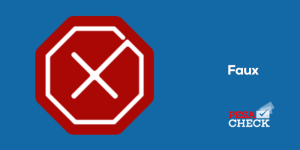By VictoryMarshal Ayafor Basang, fellow cohort 7 #AFFCameroon
INTRODUCTION
Wikipedia.org defines a web influencer as an internet celebrity (also known as a social media influencer, social media personality, internet personality, or simply influencer) who has acquired or developed their fame, a huge fan base and notability through the Internet or social media.
In our contemporary society today, social media is regarded as a vital tool that meets daily information needs of people globally. In this day and age, it’s easy to use social media to set an agenda or shape public opinion due to its accessibility and ability to reach a wide audience effectively. Increasingly, social media serves as a readily available and a viable alternative source of information especially where the mainstream media fails to play their role of serving the public’s interest first and with immediacy. Due to its liberal nature, Social Media is vulnerable to manipulation and disinformation hence one cannot rely totally on social media content as the absolute truth.
For five years now and counting, the “Cameroon Anglophone Crisis” has dominated the socio-political climate in Cameroon, with English-speaking Cameroonians of the North West and South West Regions, otherwise called Anglophones expressing their grievances on how they are marginalized.
Following recent trends on social media, Cameroon Anglophone influencers continue to feel marginalized by the majority Francophones given that they were not selected to attend the Qatar 2022 World Cup. Social media has been buzzing with claims that Anglophone web influencers were sidelined in the selection process of attending the World Cup in Qatar to support the National Football Team. It is alleged that none of the 50 Web influencers and artists flown to Qatar for the FIFA 2022 World Cup by the Cameroon Football Federation (FECAFOOT), to create content to promote Cameroon were Anglophones. This has amplified the Anglophone marginalization problem with many of them taking to Social Media to express their disgruntlement with the sidelining of their region.
On Sunday November 19, 2022, a Social Media Influencer, 237 Towncryer made a video on his page that went viral, addressed to Samuel Eto’o Fils, President of FECAFOOT where he alleged that of all the web influencers that were selected to attend the Qatar World Cup were Francophones.
On Wednesday November 23, 2022, 237 Towncryer did a follow up video addressed to Francophones, reiterating the fact that Anglophone web influencers are marginalized and decrying the increasing feelings of frustration at not being included in National Agendas.
Another influencer Bafut Pikin addressed Samuel Eto’o Fils, questioning FECAFOOT’s decision to sideline Cameroon Anglophone influencers when selecting the Qatar World Cup attendees.
On Saturday November 18 2022, Social Media Influencer Shey Eugene Brown made a post where he expressed dissatisfaction at this snub and shamed all those who believed that Anglophones don’t deserve to be included in National events.
On November 21 2022, Le Journal du Cameroun Newsblog published a rebuttal by the 4th Vice President of FECAFOOT and the South West Regional President of FECAFOOT Henry Njalla Quan Jr, where he debunked the claim that Anglophone web influencers sidelined for Qatar.
In another post by Henry Njalla Quan Jr published on Kimbi blog on Monday November 20, 2022, he clarified the criteria used in selecting web influencers and artists for the Qatar trip and explained why many Anglophones were not selected. He specifically highlighted why one Anglophone influencer Fuh Denis, who was behind the trending slogan “we go take that cup” was not selected.
Following the widespread criticisms of sidelining Anglophone influencers, Cameroon News Agency (CNA) on November 20 2022 published that FECAFOOT selected two ‘unknown’ Anglophone Comedians to the world Cup in a bid to refute the claim of marginalization and did not address true and fair representation that Anglophones were seeking.
In another Facebook post made by Njiah Derick Tata Mbiybe, on Sunday November 19, 2022, he articulates that Anglophone web influencers should stop complaining and be proactive. He posited that they should have engaged FECAFOOT through their regional executive Njalla Quan Jr. to reserve spots for them rather being passive only to later express dissatisfaction or claim marginalization.
Why Anglophones Continuously Feel Marginalized
Although the Anglophone minority constitutes 20 percent of the population of Cameroon, they are a majority in the North-West and South-West Regions. These Anglophone Cameroonians keep decrying amongst other things denial of equal professional or employment opportunities and unequal access to national life or resources
They also experience bigotry and discrimination stemming from their identity as Anglophones and the minorities with Francophones using derogatory language or bullying like referring to them as les ‘anglofous’, le Bamenda etc..
Some of the grievances that make Anglophones feel sidelined and marginalized include (but not limited to);
1. Most public exams are set in French even in English-speaking Regions. For instance, the National Entrance Examinations into professional schools like ENAM, IRIC, ESSTIC etc. that develop the human resources of Cameroon are set by the French Subsystem making it difficult for Anglophones to compete with Francophones on an equal playing field.
2. Regional balance is not really respected in stricto censo by these Examination Boards in the admission process of accepted candidates which places some bias against Anglophone candidates.
3. In the 1961 Constitution, the Vice President, a position reserved by law for Anglophones, was the second most important person in State protocol. But today, the Prime Minister (an appointed Anglophone) is the fourth most important person in State protocol after the President of the Republic, the President of the Senate and the President of the National Assembly.
4. The prioritization of the French language over the English language is a very glaring issue. State institutions conceive official documents and public notices in French, with no, or poor English translated versions.
5. Finance documents such as the COBAC Code, the CIMA Code and the OHADA Code were all conceived and published in French.
6. Most Inspection and Mission Teams, and Facilitators for Seminars sent from the Ministries in Yaounde to the English speaking regions are mostly French-speaking, and the English-speaking audience is expecting to understand them. These French-speakers demonstrate a lack of effort to gain an understanding of Anglophone culture which they think it’s of no importance to them.
All the above cited examples and more, coupled with the recent claim of Anglophone web influencers being sidelined for Qatar makes Anglophone Cameroonians continuously feel marginalized. These frustrations surfaced dramatically around November 2016 when the expressed grievances of teachers and lawyers turned into political demands, leading to socio-political instability and full blown crisis.
CONCLUSION
Cameroon is one nation with different regions and cultures making a vibrant and colourful country. Whether one is an Anglophone or Francophone, they all are Cameroonians and deserve equal opportunities and rights as Citizens. No one deserves more of the National resources because of their ethnicity but there should be equity in distribution. All patriotic Cameroonians should be empowered and supported to promote their ‘Cameroonianness’ from different angles.
RECOMMENDATIONS
Dealing with the Anglophone marginalization problem requires firmer approaches to rebuild trust through coherent measures that respond to the Anglophones demands. In that light, several steps that should be taken include:
i. The President of the Republic should publicly recognize and address the Anglophone problem and speak out on it to calm tempers that are flaring.
ii. As much as the State can, it should always ensure regional balance and equity for both Anglophones and Francophones at all levels of National life.
iii. The government should effectively implement the decentralization process and the special status given to the North West and South West Regions. This will help pacify the Anglophones and make them feel more engaged and included in National Issues.
iv. If possible, the Cameroon government and top administration should be reorganized to better reflect the demographic, political and historical identity of the Anglophones, and to include younger and more legitimate members of the Anglophones community.
v. The National Commission on Bilingualism and multiculturalism should be restructured to include an equal number of Anglophones and Francophones. Also, they should efficiently ensure official documents should be conceived in both languages.
In the longer term, Cameroon should undertake Institutional reforms to remedy the deeper problems of which the Anglophone Crisis is the symptom. To be more specific, decentralization laws should be rigorously implemented and improved to minimize the Centralized Powers from Yaoundé, through the regional assemblies to better distribute financial resources and devolve powers. Finally, it is important to take legal measures to improve levels of education, justice, Economy, Sports, and culture etc in the Anglophone regions..
GLOSSARY OF TERMS
– Social Media:
According to Cambridge English Dictionary, Social Media refers to all forms of media that allow people to communicate and share information using the internet or mobile phones. It refers to websites and computer programs that allow people to communicate and share information on the internet using a computer or mobile phone. The most common social media outlets used by people are Facebook, Twitter, Instagram, Tik Tok, LinkedIn and YouTube accounts.
– Marginalization
According to Cambridge English Dictionary, marginalization is defined as the act of treating someone or something as if they are not important, minimizing or excluding them from national life, because of their identity.
–Anglophones:
According to Collins English Dictionary, Anglophones are people whose native language is English or who speak English because they live in a country where English is one of the official languages.
– Francophones:
On the other hand, the same Collins English Dictionary defines A Francophone as someone who speaks French, especially someone who speaks it as their first language.
– Cameroon Anglophone Crisis:
According to wikipedia.org, the Cameroon Anglophone Crisis, also known as the Cameroonian Civil War, is an ongoing civil war in the English-speaking Northwest and Southwest regions of Cameroon, part of the long-standing Anglophone problem.
Generally, the Anglophone problem dates back to the independence period where re-unification considered by Anglophones as poorly conducted and based on Centralization and assimilation, has led the Anglophone minority to feel politically and economically marginalized and that their cultural differences are ignored.



